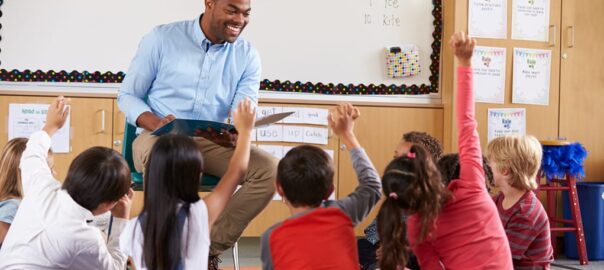Numerous raucous school board meetings across the country have made the news in recent months. If you really care about what is going on in our public schools, here is a list of suggestions for what you can do and how you can help.
Volunteer. Schools appreciate volunteers in classrooms and in the school library whether you have children in your local public school or not. Schools have always welcomed the partnership of parents and community members in our shared effort to help the next generations become responsible citizens and decent human beings. Your school administration may need to vet you and train you—a good sign that they are paying attention and taking care to protect our children.
Read to children. Help keep the library books organized. Chaperone field trips. Bring snacks. Help restock teachers’ supplies. Assist English-as-a-Second-Language students. Tutor for math or reading. Attend PTO/PTA meetings. There are a variety of ways to support your local schools, staff, and students.
Get to know your local educators. Volunteering offers excellent opportunities to get to know your neighbors who staff your neighborhood schools. See first hand what they teach and which books are in the library. Ask questions to ensure that you understand what protocols are in place and why. Listen to their explanations. If you need more information, schedule a meeting with the principals. Express any concerns you may have (respectfully, of course) and pursue your questions. In my experience, public school educators have always been open, transparent, and helpful.
Get to know the students. Public schools are different from private or charter schools because they are required by law to serve every student in their attendance area. When you are there, you will see children of every size, shape, and color because the children in our public schools are a microcosm of our communities. All sorts of learning abilities, all sorts of physical abilities, all sorts of family structures, every sort of religion and plenty of children with no religious affiliation. Every one of them is unique and precious and valuable. Each and every one has potential that needs to be encouraged and nurtured. That’s what our educators are there to do. That’s what you can do as a public school volunteer.
Finally, communicate with your local School Board members. Local school board trustees went to considerable effort and expense to run for these positions of trust because they care. They care about the local school system, about the teachers who are there to teach, the students who are there to learn, and the administrators who are there to facilitate teaching and learning. Because they care deeply, they have been affected deeply by unprecedented challenges. They have had to made complicated and difficult decisions during a global pandemic. They have had to oversee on-line learning in their districts that may have been ill prepared for such dramatic change. They have had to watch without being able to fix all the problems the students and teachers endure. And through all this, they have had to weather extraordinary opposition, anger, and even threats of violence.
If you have concerns you wish to share, offer your suggestions and critique with generosity, humility, and an open mind. These are your allies and your neighbors; please treat them as such.
Thoughtful critique can be a helpful and healthy thing. Careless criticism . . . not so much.

My youngest child graduated high school last June, and I’m so very glad to be done with this district. I’m not sure which is more frustrating – seeing the mob mentality of parents, or watching the school board members drop the pretense of doing what’s best for kids and teachers. Immediately after graduation, I unfollowed every thing district- and school-related.
As a long time public school teacher, it is infuriating to listen to public figures, politicians and pundits, trashing public education when they have absolutely no stake in it, nor experience with it. I am a career changer who entered the ranks of public education in my 40s. The things that struck that struck me the most were upon entering it were; how difficult the job is, how dedicated and hard working the people who work in schools are, and just how many great opportunities are out there for kids that aren’t taken advantage of or celebrated enough. Before you criticize your local public school, go volunteer and spend some time there and witness first hand the amazing stuff that happens on a daily basis. If after taking the time to invest yourself in the system, if you still have a negative impression of educators, then you have grounds for complaints. Otherwise, go bark up another tree.
I am most concerned about responding to the bigger picture that threats of violence to schools are increasingly working (thread: https://twitter.com/Phil_Lewis_/status/1484550121496973313) in school districts where local authorities excuse the threats, and board members grappling with keeping their community safe either are replaced on the school board or quickly rescind their plan for masking or whatever.
great column!! As a former teacher, I don’t think I could take the abuse heaped on schools today. It is a sad situation.
Thank you,